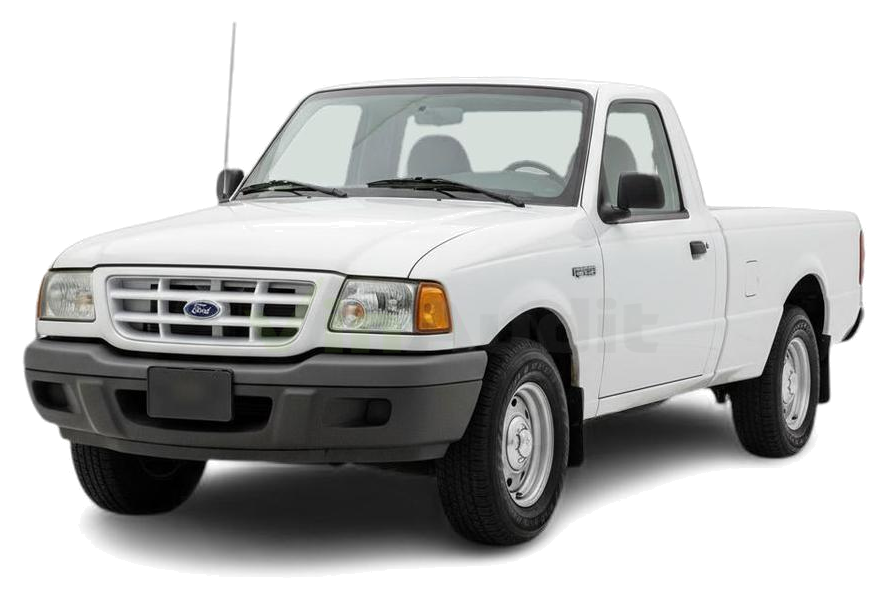The 2002 Ford Ranger is a compact pickup truck, part of the second generation (1998-2012). It's a classic workhorse known for its reliability and affordability. Body styles include regular cab, SuperCab (extended cab), and Styleside beds. Key trims include XL, XLT, and Edge (later Sport). The original MSRP ranged from around $12,000 to $20,000. It's popular for its manageable size, ease of parking, and decent fuel economy compared to larger trucks.
The Good
The 2002 Ford Ranger offers dependable performance and is relatively easy to maintain, making it a practical choice. Its compact size provides good maneuverability. Emotionally, it evokes a sense of rugged simplicity and affordability, appealing to those who value a no-nonsense, reliable truck. Its robust engine and durable construction instill confidence in its longevity, offering value for money.
The Bad
The 2002 Ford Ranger, while reliable, has some weaknesses. Rust, particularly in the frame, is a common concern. The automatic transmissions can be prone to issues if not properly maintained. Interior plastics can be fragile and show wear easily. The ride quality can be stiff, and the cabin is relatively basic. Check for signs of leaks.
2002 Ford Ranger: Quick Overview
- Engine Options:
- 2.3L Inline-4: Base engine, offered on lower trims.
- 3.0L V6: Optional, providing more power and torque.
- 4.0L V6: The most powerful option, available on higher trims like the Edge/Sport.
- Horsepower:
- 2.3L I4: Approximately 119-143 hp.
- 3.0L V6: Approximately 150 hp.
- 4.0L V6: Approximately 207 hp.
- Fuel Economy (estimated):
- 2.3L I4: 22 mpg city / 26 mpg highway.
- 3.0L V6: 17 mpg city / 22 mpg highway.
- 4.0L V6: 16 mpg city / 20 mpg highway.
- 0-60 Times:
- Varies significantly based on engine and configuration. The 4.0L V6 could achieve 0-60 mph in around 8-9 seconds. The 2.3L I4 was considerably slower.
- Towing Capacity:
- Ranging from approximately 2,000 lbs to 6,000 lbs depending on engine, drivetrain (2WD/4WD), and configuration (cab/bed). The 4.0L V6 models typically offered the highest towing capacity.
- Trim-Level Features:
- XL: Base model; typically included vinyl seats, basic radio, and minimal features.
- XLT: Added cloth seats, improved interior trim, air conditioning, and often included options like power windows and locks.
- Edge (Sport): Marketed towards a more active lifestyle, often included upgraded wheels, sporty exterior trim, fog lights, and sometimes a premium sound system.
2002 Ford Ranger Specifications
Vehicle Information
| Year | 2002 |
| Make | Ford |
| Model | Ranger |
| Trim | - |
| Style | - |
| Type | Truck |
| Category | Small Pickup Truck |
Manufacturing Details
| Made In | United States |
| Manufacturing City | HAPEVILLE |
Dimensions
| Doors | 2-Door |
| Curb Weight | 3085 pounds |
| Gross Vehicle Weight Rating | 4340 pounds |
| Overall Height | - |
| Overall Length | - |
| Overall Width | - |
| Wheelbase Length | - |
| Standard Seating | - |
Engine & Performance
| Engine | 4L V6 |
| Engine Size | 4L |
| Engine Cylinders | 6 |
| Transmission | Manual |
| Transmission Type | Manual |
| Transmission Speeds | 5-Speed |
| Drivetrain | Rear-Wheel Drive |
Additional Features
| Anti-Brake System | - |
| Steering Type | - |
Pricing
| Manufacturer Suggested Retail Price (MSRP) | $12,955 |
| Invoice Price | $12,394 |
| Delivery Charges | $610 |
Vehicle History Report
Vehicle
Specifications
Specifications
Ownership
History
History
All History
Events
Events
NMVTIS Title
History Check
History Check
Salvage/Rebuilt
Check
Check
Accident
Check
Check
Theft
Check
Check
Open Lien
Check
Check
Past Sale
Listings
Listings
Safety
Recalls
Recalls
Odometer
Check
Check
Market Price
Analysis
Analysis
What Problems Does the 2002 Ford Ranger Have?
The 2002 Ford Ranger is generally considered reliable, but several issues are frequently reported. Rust, especially in the frame, is a significant concern, particularly in regions with harsh winters and road salt usage. This can lead to structural problems and safety hazards. The automatic transmissions, especially the 5R55E, can experience issues with slipping or harsh shifting if not regularly serviced. Engine issues, such as oil leaks and sensor failures, are also reported. The 4.0L V6, while powerful, can be prone to timing chain issues in later years if maintenance is neglected.
Several recalls affected the 2002 Ranger, including concerns about the speed control system potentially malfunctioning and causing unintended acceleration and issues related to the airbags. Owners should check the NHTSA website for open recalls related to their specific VIN. Other long-term reliability concerns include wear and tear on suspension components, ball joints, and tie rod ends. Interior plastics are prone to cracking and fading, leading to cosmetic issues. Electrical problems, such as malfunctioning gauges and lights, can also occur as the vehicle ages. Regular maintenance, addressing rust proactively, and checking for open recalls are crucial for ensuring the long-term reliability of a 2002 Ford Ranger.
Several recalls affected the 2002 Ranger, including concerns about the speed control system potentially malfunctioning and causing unintended acceleration and issues related to the airbags. Owners should check the NHTSA website for open recalls related to their specific VIN. Other long-term reliability concerns include wear and tear on suspension components, ball joints, and tie rod ends. Interior plastics are prone to cracking and fading, leading to cosmetic issues. Electrical problems, such as malfunctioning gauges and lights, can also occur as the vehicle ages. Regular maintenance, addressing rust proactively, and checking for open recalls are crucial for ensuring the long-term reliability of a 2002 Ford Ranger.
How long will the 2002 Ford Ranger last?
With proper maintenance, a 2002 Ford Ranger can easily reach 200,000 miles or more and provide 20+ years of service. The key to longevity is diligent maintenance, including regular oil changes, transmission fluid flushes, and addressing issues promptly. However, rust is a major factor affecting long-term durability, particularly in areas with road salt. Neglecting rust prevention can significantly shorten the lifespan. Weaknesses over time include wear on suspension components, potential engine issues (especially with the 4.0L V6), and deterioration of interior plastics. The automatic transmissions also require careful maintenance to avoid problems.
What Technology & Safety Features are Included?
The 2002 Ford Ranger was relatively basic in terms of built-in tech, entertainment, and driver-assistance features compared to modern vehicles. Standard features were minimal, typically including an AM/FM radio and basic instrumentation. Higher trims like the XLT might have included a CD player and upgraded speakers as optional features. There were no advanced driver-assistance systems (ADAS) available.
Safety features included standard front airbags and anti-lock brakes (ABS) were often optional. Side airbags were not available. The 2002 Ford Ranger received crash-test ratings from the National Highway Traffic Safety Administration (NHTSA). Results varied depending on the cab configuration. Regular cab models generally scored lower than SuperCab models in frontal crash tests. Rollover ratings were also a concern. Considering its age, the 2002 Ranger lacks modern safety technology, and its crash-test performance is not comparable to newer vehicles. Optional features included things like cruise control, but overall it was a very basic offering compared to what is available today. It's important to remember that safety standards have evolved substantially since 2002.
Safety features included standard front airbags and anti-lock brakes (ABS) were often optional. Side airbags were not available. The 2002 Ford Ranger received crash-test ratings from the National Highway Traffic Safety Administration (NHTSA). Results varied depending on the cab configuration. Regular cab models generally scored lower than SuperCab models in frontal crash tests. Rollover ratings were also a concern. Considering its age, the 2002 Ranger lacks modern safety technology, and its crash-test performance is not comparable to newer vehicles. Optional features included things like cruise control, but overall it was a very basic offering compared to what is available today. It's important to remember that safety standards have evolved substantially since 2002.
What Colors Options are Available?
Exterior Colors
Dark Shadow Grey Metallic
Bright Red
Oxford White
Arizona Beige Metallic
Atlantic Blue Metallic
Harvest Gold Metallic
Black
Interior Colors
Medium Graphite
Tan
2002 Ford Ranger Prices and Market Value
The 2002 Ford Ranger had a starting MSRP of around $12,000 for the base XL model and could reach $20,000+ for a fully equipped Edge/Sport SuperCab. As a used vehicle, prices vary widely based on condition, mileage, and location, typically ranging from $2,000 to $8,000. Depreciation has been significant, but these trucks retain some value due to their reputation for reliability and utility. Factors affecting resale value include rust, mechanical condition, mileage, and trim level. 4x4 models and those with the 4.0L V6 generally command higher prices. Low mileage, well-maintained examples are increasingly sought after by enthusiasts.
2002 Ford Ranger Cost of Ownership
The 2002 Ford Ranger is generally economical to own. Insurance costs are typically lower than larger trucks or SUVs. Fuel economy is decent for a pickup of its size. Maintenance costs are relatively low due to the Ranger's simple design and readily available parts. Repairs are generally affordable. However, rust repair can be expensive. Overall, the Ranger presents a budget-friendly ownership experience, especially if maintenance is performed proactively. Fuel costs can be higher on the 4.0L V6 models.
2002 Ford Ranger Fuel Efficiency
Fuel Type
Gasoline
Fuel Capacity
16.5 gallons
City Mileage
17 miles/gallon
Highway Mileage
21 miles/gallon
2002 Ford Ranger Safety Rating
NHTSA
IIHS
2002 Ford Ranger Insurance
Insurance for a 2002 Ford Ranger is moderately priced, reflecting its status as a Truck with strong safety ratings and
reasonable repair costs.
reasonable repair costs.
How Does the 2002 Ford Ranger Compare to Other Truck?
The 2002 Ford Ranger's key rivals included the Chevrolet S-10, GMC Sonoma, and Toyota Tacoma. In terms of reliability, the Ranger was generally comparable to the S-10/Sonoma, but the Tacoma often had a slight edge. Performance-wise, the Ranger's 4.0L V6 was competitive, but the Tacoma offered more powerful engine options in later years. Features were fairly similar across the class, with basic amenities in lower trims and more options in higher trims. Price-wise, the Ranger was usually more affordable than the Tacoma, but similar to the S-10/Sonoma.
Alternatives to the 2002 Ford Ranger include the Nissan Frontier, which offered a similar blend of practicality and affordability. The Mazda B-Series was essentially a rebadged Ranger, so it's a very similar alternative. The Toyota Tacoma, while often more expensive, might be a better choice for those prioritizing long-term reliability and resale value. For budget-conscious buyers, the Ranger offers a good balance of value and capability. However, considering the age of these trucks, condition and maintenance history are paramount.
Alternatives to the 2002 Ford Ranger include the Nissan Frontier, which offered a similar blend of practicality and affordability. The Mazda B-Series was essentially a rebadged Ranger, so it's a very similar alternative. The Toyota Tacoma, while often more expensive, might be a better choice for those prioritizing long-term reliability and resale value. For budget-conscious buyers, the Ranger offers a good balance of value and capability. However, considering the age of these trucks, condition and maintenance history are paramount.
Final Verdict: Is the 2002 Ford Ranger a Good Truck?
The 2002 Ford Ranger is ideal for buyers seeking an affordable, compact, and reliable pickup for light-duty tasks. It's a good choice for those who don't need the size or towing capacity of a full-size truck. Whether it's worth buying depends heavily on the condition and price. Given its age, buying a well-maintained example is crucial. Look for models with documented maintenance history and minimal rust. The XLT or Edge trim levels offer more features than the base XL. For those needing extra power, the 4.0L V6 is preferred. Avoid trucks with excessive rust or signs of neglect. A thorough inspection by a qualified mechanic is highly recommended before purchase.

